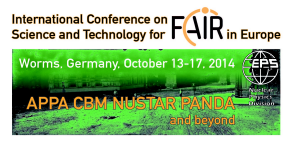Sprecher
Dr.
Anna Maiorova
(St. Petersburg State University)
Beschreibung
Radiative recombination (RR) is one of the basic processes that
occurs in laboratory plasma, in collisions of heavy ions with
electrons at ion storage rings and EBIT. During the last decades
RR of highly charged heavy ions remains the subject of intense
theoretical and experimental research (see Ref.[1] and references therein). Radiative recombination is a time-reversed photoionization, hence it allows to study this fundamental electron-photon interaction in large-energy and strong-field regime, which is not accessible in the direct channel. Moreover, the RR is very sensitive to the spin, relativistic and QED effects in the structure and dynamics of heavy atomic systems.
We investigate the radiative recombination of the relativistic
electron with bare heavy ion into the $2p_{3/2}$ excited state of
H-like ion and its subsequent Lyman-$\alpha_{1}$ ($2p_{3/2}
\rightarrow 1s_{1/2}$) decay. We consider the scenario where RR
photon and subsequently emitted characteristic photon are detected in coincidence. In this case the axial symmetry of the
RR-populated $2p_{3/2}$ state is removed and the magnetic sublevels of the highly charged ion are populated coherently
[2]. In our previous work [3] we found a rather strong correlation between the polarization states and emission patterns of the recombination and decay photons in the process under consideration. In the present work we have employed the density matrix approach and relativistic Dirac's theory for description of the coherence between the magnetic substates of the highly charged heavy ion.
[1] J.Eichler and Th.Stoehlkler, Phys. Rep. 439, 1 (2007).
[2] N.Andersen, J.Gallagher, and I.V.Hertel, Phys. Rep. 165, 1
(1988).
[3] A.V.Maiorova et al, J.Phys.B 42, 125003 (2009).
Autor
Dr.
Anna Maiorova
(St. Petersburg State University)
Co-Autoren
Andrey Surzhykov
(GSI, Darmstadt)
Dr.
Stanislav Tashenov
(Heidelberg University)
Thomas Stöhlker
(GSI, Darmstadt)
Vladimir Shabaev
(SPbSU)

